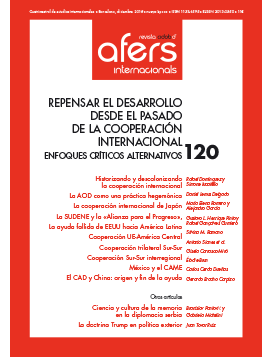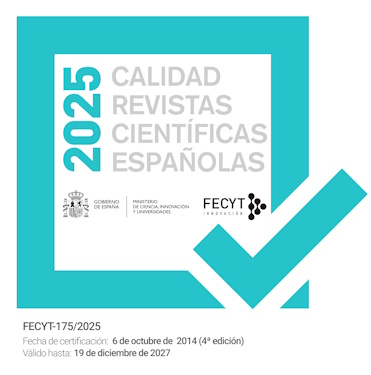Cooperación trilateral Sur-Sur al desarrollo: por una descolonización de la solidaridad
Paraules clau:
cooperación trilateral Sur-Sur, desarrollo, solidaridad, Brasil, Mozambique, Banco MundialResum
Revista CIDOB d’Afers Internacionals, nº 120
Cuatrimestral (octubre-diciembre 2018)
ISSN:1133-6595 | E-ISSN:2013-035X
DOI: doi.org/10.24241/rcai.2018.120.3.147
La cooperación trilateral Sur-Sur al desarrollo (CTSS) ha generado un gran debate sobre si estas alianzas constituyen un nuevo paradigma para el desarrollo o solo son un disfraz para una nueva forma de imperialismo. Más allá de las categorizaciones, este artículo muestra una imagen más matizada y examina el enfoque de solidaridad de la CTSS, esto es, la naturaleza intrínsecamente política del desarrollo y las relaciones de poder desiguales presentes en su seno. A partir del Memorando de Entendimiento (MdE) de CTSS entre Brasil, Mozambique y el Banco Mundial, se analizan las narrativas del desarrollo agrícola y los imaginarios sociales que lo sustentan, a fin de comprender mejor los patrones y motivaciones de solidaridad. Al constatar la lógica colonial, capitalista y patriarcal que se mantiene en el concepto de solidaridad utilizado en el marco actual de desarrollo, este artículo sugiere descolonizar dicho concepto.
Referències
Altieri, Miguel A. y Bravo, Elizabeth. «The Ecological and Social Tragedy of Crop-based Biofuel Production in the Americas». En: Jonasse, Richard (ed.). Agrofuels in the Americas. Oakland, CA: Food First Books, 2009, p. 15-24.
Amanor, Kojo. «South–South cooperation in Africa: Historical, geopolitical and political economy dimensions of international development». IDS Bulletin, vol. 44, n.° 4 (2013), p. 20-30.
Amanor, Kojo y Chichava, Sérgio. «South-South Cooperation, Agribusiness, and African Agricultural Development: Brazil and China in Ghana and Mozambique». World Development, vol. 81, (2016), p. 13-23.
Amorim, Celso. «Brazil is too important to stay out of global issues». Instituto Lula (5 de julio de 2016) (en línea) http://www.instituto lula.org/en/brazilis-too-important-to-stay-out-of-global-issues-says-celso-amorim
Cabral, Lídia; Favareto, Arilson; Mukwereza, Langton y Amanor, Kodjo. «Brazil’s Agricultural Politics in Africa: More Food International and the Disputed Meanings of ‘Family Farming’». World Development, vol. 81 (2016), p. 47-60.
Carrasco-Miró, Gisela. «EcoSImies of Care: A Proposal for Decolonizing ‘Sustainable Development’». Insurgencies from the South and Human Right: From the European South, n.° 2 (2017), p. 89-108.
Cheru, Fantu. «Emerging Southern Powers and New Forms of South–South Cooperation: Ethiopia’s Strategic Engagement with China and India». Third World Quarterly, vol. 37, n.° 4 (2016), p. 592-610.
Clements, Alice Elisabeth y Mançano Fernandes, Bernardo. «Land Grabbing, Agribusiness and the Peasantry in Brazil and Mozambique». Agrarian South: Journal of Political Economy, vol. 2, n.° 1 (2013), p. 41-69.
DATALUTA. «Relatorio Brasil 2011». Núcleo de Estudos, Pesquisas e Projetos de Reforma Agrária, (octubre de 2012) (em línea) http://docs.fct.unesp.br/nera/projetos/dataluta_brasil_2011.pdf
ECOSOC. «The Evolution of South-South Development Cooperation: Its Role in the Implementation of the 2030 Agenda and the Paris Agreement on Climate Change». DCF Policy Briefs, n.° 17 (septiembre de 2017).
Escobar, Arturo. Encountering Development: The Making and Unmaking of the Third World. Princeton: Princeton University Press, 1995.
Escobar, Arturo. «Thinking-Feeling with the Earth: Territorial Struggles and the Ontological Dimension of the Epistemologies of the South». Revista de Antropología Iberoamericana, vol. 11, n.° 1 (2016), p. 11-32.
Fanon, Frantz. The Wretched of the Earth. Nueva York: Grove Press, 1963.
Gaztambide-Fernández, Rubén A. «Decolonization and the pedagogy of solidarity». Decolonization: Indigeneity, Education & Society, vol. 1, n.° 1 (2012), p. 41-67.
González, Erika; Hernández, Juan y Ramiro, Pedro. «Regular las empresas para defender los derechos humanos: un desafío global». Pueblos. Revista de información y debate, n.° 76 (febrero de 2018) (en línea) http://www.revistapueblos.org/blog/2018/03/05/regular-a-las-empresas-para-defender-los-derechos-humanos-un-desafio-global/Human Rights Watch. «How Can We Survive Here? The impact of Mining on Human Rights in Karamoja, Uganda». Human Rights Watch, (febrero
de 2014) (en línea) https://www.hrw.org/sites/default/files/reports/uganda0214_insertWithcover.pdf
IDI-Inclusive Development International. «Unjust Enrichment: How the IFC Profits from Land Grabbing in Africa». IDI, (abril de 2017) (en línea) https://www.inclusivedevelopment.net/wp-content/uploads/2017/04/OutsourcingDevelopment-Africa.pdf
IFAD-International Fund for Agricultural Development. «IFAD’s Approach to South-South and Triangular Cooperation». IFAD, (23 de noviembre de 2016) (en línea) https://webapps.ifad.org/members/eb/119/docs/EB-2016-119-R-6.pdf
JA! Justica Ambiental. «Justiça Ambiental/FOE Mozambique’s Position on the ProSAVANA Program». JA4Change (28 de enero de 2013) (en línea) https://ja4change.wordpress.com/2013/01/28/justica-ambientalfoe-mozambiquesposition-on-the-prosavana-program/
JICA-Japan International Cooperation Agency. «Investigation Report. The Support for Agricultural Development Master Plan for Nacala Corridor. In The Republic of Mozambique». JICA, (noviembre de 2017) (en línea) https://www.jica.go.jp/english/our_work/social_environmental/objection/c8h0vm0000b81di4-att/mozambique_01_06.pdf
Kapoor, Ian. The Postcolonial Politics of Development. Londres: Routledge, 2008.
Kari-Oca 2 Declaration. «Indigenous Peoples Conference on Rio+20 and Mother Earth». Indigenous Enviromental Network, (17 de junio de 2012) (en línea) http://www.ienearth.org/docs/DECLARATION-of-KARIOCA-2-Eng.pdf
Klein, Naomi. This Changes Everything. Nueva York: Simon & Schuster, 2014.
Mohanty, Chandra. «Under Western Eyes: Feminist Scholarship and Colonial Discourse». Feminist Review, n.° 30 (1988), p. 61-88.
Mohanty, Chandra. «Preface: Toward a Decolonial Feminism for the 99 Percent». En: McLaren, Margaret (ed.). Decolonising feminism: Transnational Feminism and Globalization. Londres: Rowman Littlefield International, 2017, p. vii–xi.
Ouma, Stefan. «Situating Global Finance in the Land Rush Debate: A Critical Review». Geoforum, vol. 57 (2014), p. 162-166.
OXFAM. Our Land, Our Lives: Time Out on the Global Land Rush. OXFAM Briefing Note, (octubre de 2012) (en línea) https://www.oxfam.org/sites/www.oxfam.org/files/bn-land-lives-freeze-041012-en_1.pdf
OXFAM. Owning the Outcomes: Time to Make the World Bank Group’s Financial Intermediary Investments More Accountable. OXFAM Briefing Note, (octubre de 2016) (en línea) https://www.oxfam.org/sites/www.oxfam.org/files/file_attachments/bn-ifc-owning-outcomes-031016-en_0.pdf
People’s Declaration. «No to ProSavana Campaign: Peoples’ Declaration». Farmlandgrab (25 de octubre de 2017) (en línea) https://www.farmlandgrab.org/post/view/27603-no-to-prosavana-campaign-peoples-declaration
Pérez Orozco, Amaia. Subversión feminista de la economía. Madrid: Traficantes de sueños, 2014.
Pérez Orozco, Amaia. Aprendizajes de las resistencias feministas latinoamericanas a los tratados de comercio e inversión. Madrid: Observatorio de Multinacionales en América Latina–Paz con Dignidad, 2017.
Plaza, Beatriz y Ramiro, Pedro. Justicia privatizada: El Estado español y los mecanismos de resolución de controversias inversor-Estado, Ecologistas en Acción. Madrid: Observatorio de Multinacionales en América Latina–Paz con Dignidad, 2016 (en línea) http://omal.info/IMG/pdf/justicia_privatizada_-_informe_final.pdf
Relatório de Insustentabilidade. «Relatório de Insustentabilidade 2015». Instituto PACS, (2015) (en línea) www.pacs.org.br/files/2015/04/Relatirio_pdf.pdf
Rincón, Luis Felipe y Mançano, Bernardo. «Agrarian Change by the BRICS’ Large-Scale Investments in the Global Agrarian South: Focus on Brazil, Colombia and Mozambique». The 5th International Conference of the BRICS Initiative for Critical Agrarian Studies, (13-16 de octubre de 2017) (en línea) https://www.iss.nl/sites/corporate/files/2017-11/BICAS%20CP%20 5-42%20Rincon%20and%20Fernande.pdf
Said, Edward. Orientalism. New York: Pantheon Books, 1978
Scoones, Ian; Amanor, Kojo; Favareto, Arilson y Qi, Gubo. «A New Politics of Development Cooperation? Chinese and Brazilian Engagements in African Agriculture». World Development, vol. 81 (2016), p. 1-12.
Shankland, Alex y Gonçalves, Euclides. «Imagining Agricultural Development in South-South Cooperation: The Contestation and Transformation of ProSAVANA». World Development, vol. 81 (2016), p. 35-46.
The Economist. «Brazilian Agriculture: The Miracle of the Cerrado». The Economist, (26 de agosto de 2010) (en línea) https://www.economist.com/node/16886442
Treguer, David y Pehu, Eija. «Moving toward a sustainable landscape approach to development». Agriculture and environmental services note, n.° 12 (2014) (en línea) http://documents.worldbank.org/curated/en/819501468151511677/Moving-toward-a-sustainable-landscape-approach-to-development
Tuck, Eve y Yang, Wayne, K. «Decolonization Is Not a Metaphor». Decolonization: Indigeneity, Education & Society, vol. 1, n.° 1 (2012), p. 1-40.
UN-United Nations. «Resolution Adopted by the General Assembly. Transforming Our World: The 2030 Agenda for Sustainable Development». UN, A/RES/70/1, (25 de septiembre de 2015) (en línea) http://www.un.org/en/development/desa/population/migration/generalassembly/docs/globalcompact/A_RES_70_1.pdf
United Nations Human Rights Council. «Open-ended intergovernmental working group on transnational corporations and other business enterprises with respect to human rights». OHCHR, (2018) (online) http://www.ohchr.org/EN/HRBodies/HRC/WGTransCorp/Pages/IGWGOnTNC.aspx
UNOSCC-United Nations Office for South-South Cooperation. «About South-South and Trilateral Cooperation». UNOSCC, (2018) (en línea)
https://www.unsouthsouth.org/about/about-sstc/
WB-World Bank. «Awakening Africa’s Sleeping Giant Prospects for Commercial Agriculture in the Guinea Savannah Zone and Beyond». (2009) (en línea) https://siteresources.worldbank.org/INTARD/Resources/sleeping_giant.pdf
WB-World Bank. «Rising Global Interest in Farmland». (2011) (en línea) https://siteresources.worldbank.org/DEC/Resources/Rising-Global-Interest-in-Farmland.pdf
WB-World Bank. «Collaborating Across Continents: Mozambique, Brazil and the World Bank Deepen South-South Cooperation on Sustainable Rural Development». WB, (15 de mayo de 2017) (en línea) http://www.worldbank.org/en/news/feature/2017/05/15/collaborating-across-continents-mozambique-brazil-and-the-world-bank-deepen-south-south-cooperation-on-sustainable-rural-development
WFP-World Food Programme. «South-South and Triangular Cooperation for Food Security and Nutrition». WFP, (octubre de 2016) (en línea) http://documents.wfp.org/stellent/groups/public/documents/communications/wfp289623.pdf?_ga=1.239290571.938730172.1483120418













